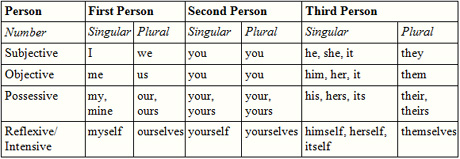Writing Tip
Avoid Overcompensation with Tricky Words
Difficulty Level: Intermediate
Recommendation: Avoid overcompensation when using personal pronouns and other tricky words.
Sometimes we take cues from the speech of learned people and modify--and sometimes overcorrect--our language to be “correct” like them. In an attempt to avoid “vulgar” violations of proper English, we overcompensate (also called “hypercorrection”), creating a clumsy or embarrassing violation of English grammar. I’ve been there. Perhaps you’ve been there too. Lots of people go there and never know that they went there. Here are some examples.
Personal Pronouns
The real villain in overcompensation is personal pronouns. We have person to worry about (first, second, and third person). We have number to worry about (singular or plural). We have gender to worry about (masculine, feminine, and neuter: sex complicates everything). We have to worry about case (subjective, objective, possessive). Let’s start with a table of personal pronouns and get to the prime offender:

The prime offender is “case,” in the first and third person. Let’s look at an example of overcompensation of the (brace for impact) first-person, singular, subjective, genderless pronoun “I.” Some hear “I” used in all sorts of formal contexts and use it indiscriminately in their language. For example:
The disagreement was between Barry and I.
In this case, “I” is the object of the preposition “between,” and so the correct pronoun should be the objective form, which is “me.” But “me” does not sound as learned as “I,” so the influence of highly educated people and their nimble use of “I” sometimes trumps our intuitive drive to use “me.” We just don’t want to sound linguistically uninformed.
On the other hand, we have the problem of the third person. Consider:
The disagreement was between he and I.
A double whammy. Again, these pronouns are used in the objective case. So “he and I” should be “him and me.” Sounds decidedly less learned, but those are the grammatically correct words.
I am straight-out encouraging you to use the correct forms of personal pronouns, but I don’t want to downplay the tension inherent in overcompensation, and that is: When you use the correct forms, overcompensators will think that you have made mistakes. Do we write for them? Do we write for those who know the rules? Do we write for all? Can we “ “right” for all? If you know the answer to this, please write it on a $100 bill and send it to me via interoffice mail (please conceal it in an envelope).
Who/Whom
The rule for selecting “who” or “whom” requires the author to consider its case in the sentence: That is, whether it is used as a subject or an object. When the case is subjective, use “who”; when objective, use “whom.” Professors use “whom” a lot, so we should too, right? Here’s an example of overcompensation:
I don’t know whom is going to write this report.
“Whom” is used as the subject of the clause “whom is going to write this report”--it is the subject of “is going.” Therefore, the correct word is “who.”
However, there are constructions that sound like overcompensation but are not. Consider:
Whom did the paparazzi badger yesterday?
You can transform this sentence from an interrogative into a declarative to get a better feel for which word is correct:
The paparazzi badgered whom yesterday.
It’s easier to see that indeed the correct word is the object of the verb “badgered,” so “whom” is correct, even though it sounds a bit pretentious to my ears. You could probably get away with “who” in this case, but sticklers will say nay, ‘tis better to be right and wrong-sounding than wrong and right-sounding.
Irregular Plural Nouns (from Antiquity)
Using the plural forms of some borrowed Latin and Greek words may sound pretentious. Here is a list:
“Antennae” is the plural of “antenna.” Try using “antennas” instead.
“Viri” is the plural of “virus.” Try using “viruses” instead.
“Appendices” is the plural of “Appendix.” Try using “appendixes” instead (same with “indices” and “matrices”).
Ending a Sentence with a Preposition
All sorts of twisting is condoned to avoid ending a sentence with a preposition. Many times, this twisting is unwarranted work. I wrote about this in a previous tip/essay:
Commentary Number 7
Remember what Winston Churchill said: This is the kind of arrant pedantry up with which I will not put.